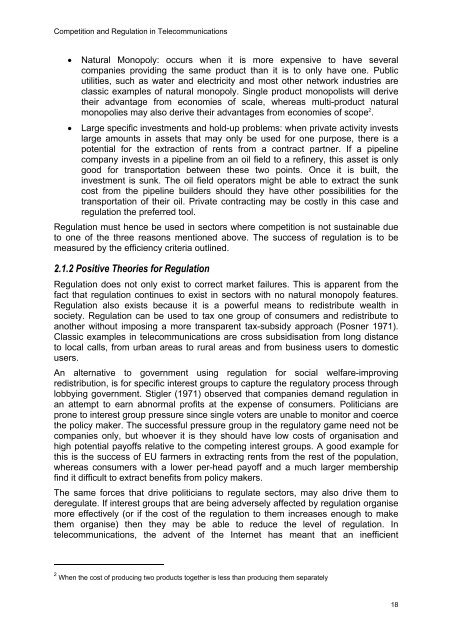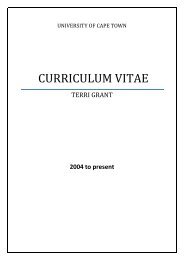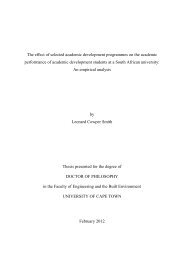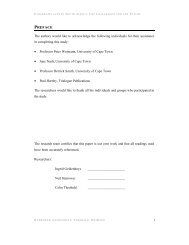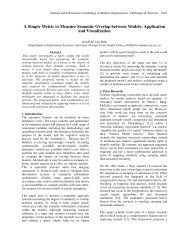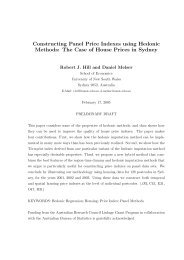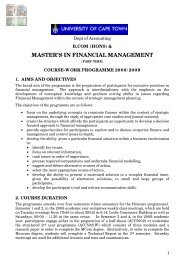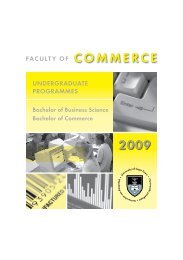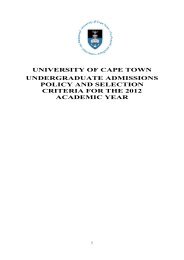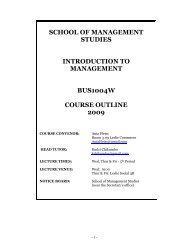Competition and Regulation in the Telecommunications Industry in ...
Competition and Regulation in the Telecommunications Industry in ...
Competition and Regulation in the Telecommunications Industry in ...
You also want an ePaper? Increase the reach of your titles
YUMPU automatically turns print PDFs into web optimized ePapers that Google loves.
<strong>Competition</strong> <strong>and</strong> <strong>Regulation</strong> <strong>in</strong> <strong>Telecommunications</strong>• Natural Monopoly: occurs when it is more expensive to have severalcompanies provid<strong>in</strong>g <strong>the</strong> same product than it is to only have one. Publicutilities, such as water <strong>and</strong> electricity <strong>and</strong> most o<strong>the</strong>r network <strong>in</strong>dustries areclassic examples of natural monopoly. S<strong>in</strong>gle product monopolists will derive<strong>the</strong>ir advantage from economies of scale, whereas multi-product naturalmonopolies may also derive <strong>the</strong>ir advantages from economies of scope 2 .• Large specific <strong>in</strong>vestments <strong>and</strong> hold-up problems: when private activity <strong>in</strong>vestslarge amounts <strong>in</strong> assets that may only be used for one purpose, <strong>the</strong>re is apotential for <strong>the</strong> extraction of rents from a contract partner. If a pipel<strong>in</strong>ecompany <strong>in</strong>vests <strong>in</strong> a pipel<strong>in</strong>e from an oil field to a ref<strong>in</strong>ery, this asset is onlygood for transportation between <strong>the</strong>se two po<strong>in</strong>ts. Once it is built, <strong>the</strong><strong>in</strong>vestment is sunk. The oil field operators might be able to extract <strong>the</strong> sunkcost from <strong>the</strong> pipel<strong>in</strong>e builders should <strong>the</strong>y have o<strong>the</strong>r possibilities for <strong>the</strong>transportation of <strong>the</strong>ir oil. Private contract<strong>in</strong>g may be costly <strong>in</strong> this case <strong>and</strong>regulation <strong>the</strong> preferred tool.<strong>Regulation</strong> must hence be used <strong>in</strong> sectors where competition is not susta<strong>in</strong>able dueto one of <strong>the</strong> three reasons mentioned above. The success of regulation is to bemeasured by <strong>the</strong> efficiency criteria outl<strong>in</strong>ed.2.1.2 Positive Theories for <strong>Regulation</strong><strong>Regulation</strong> does not only exist to correct market failures. This is apparent from <strong>the</strong>fact that regulation cont<strong>in</strong>ues to exist <strong>in</strong> sectors with no natural monopoly features.<strong>Regulation</strong> also exists because it is a powerful means to redistribute wealth <strong>in</strong>society. <strong>Regulation</strong> can be used to tax one group of consumers <strong>and</strong> redistribute toano<strong>the</strong>r without impos<strong>in</strong>g a more transparent tax-subsidy approach (Posner 1971).Classic examples <strong>in</strong> telecommunications are cross subsidisation from long distanceto local calls, from urban areas to rural areas <strong>and</strong> from bus<strong>in</strong>ess users to domesticusers.An alternative to government us<strong>in</strong>g regulation for social welfare-improv<strong>in</strong>gredistribution, is for specific <strong>in</strong>terest groups to capture <strong>the</strong> regulatory process throughlobby<strong>in</strong>g government. Stigler (1971) observed that companies dem<strong>and</strong> regulation <strong>in</strong>an attempt to earn abnormal profits at <strong>the</strong> expense of consumers. Politicians areprone to <strong>in</strong>terest group pressure s<strong>in</strong>ce s<strong>in</strong>gle voters are unable to monitor <strong>and</strong> coerce<strong>the</strong> policy maker. The successful pressure group <strong>in</strong> <strong>the</strong> regulatory game need not becompanies only, but whoever it is <strong>the</strong>y should have low costs of organisation <strong>and</strong>high potential payoffs relative to <strong>the</strong> compet<strong>in</strong>g <strong>in</strong>terest groups. A good example forthis is <strong>the</strong> success of EU farmers <strong>in</strong> extract<strong>in</strong>g rents from <strong>the</strong> rest of <strong>the</strong> population,whereas consumers with a lower per-head payoff <strong>and</strong> a much larger membershipf<strong>in</strong>d it difficult to extract benefits from policy makers.The same forces that drive politicians to regulate sectors, may also drive <strong>the</strong>m toderegulate. If <strong>in</strong>terest groups that are be<strong>in</strong>g adversely affected by regulation organisemore effectively (or if <strong>the</strong> cost of <strong>the</strong> regulation to <strong>the</strong>m <strong>in</strong>creases enough to make<strong>the</strong>m organise) <strong>the</strong>n <strong>the</strong>y may be able to reduce <strong>the</strong> level of regulation. Intelecommunications, <strong>the</strong> advent of <strong>the</strong> Internet has meant that an <strong>in</strong>efficient2 When <strong>the</strong> cost of produc<strong>in</strong>g two products toge<strong>the</strong>r is less than produc<strong>in</strong>g <strong>the</strong>m separately18


